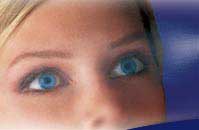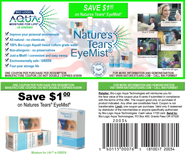
100 U.S. Cities Are Dry Eye Hot Spots
The National Women's Health Resource Center's Study of Dry Eye Risk in U.S. Cities.
Beth Battaglino Cahill (Red Bank, NJ), Executive Director of the National Woman's Health Resource Center.
This is a paraphrased summary of an interview on the Sharon Kleyne Hour - Power of Water Internet radio talk show on World Talk Radio, Apple iTunes and Green Talk Network. Sharon Kleyne is an internationally recognized entrepreneur, water and health advocate, and Founder of Bio-Logic Aqua Research and Save a Child's Life Foundation. To hear the complete show, go to www.SharonKleyneHour.com
Sharon Kleyne: In the United States, an estimated 20 million people have chronic dry eye. In China and many other countries, the percentage is much higher. On balance, the situation in the U.S. isn't bad but it could be much better. Our first guest is Beth Cahill, Executive Director of the National Woman's Health Resource Center. Her group recently sponsored a study of the top 100 US cities whose environments make them dry eye "hot spots." Beth, tell us about the dry eye problem, which is now main reason for eye doctor visits in the U.S.
Beth Cahill: According to National Woman's Health Resource Center, the number dry eye hot spot was Vegas and five of the top ten dry eye hot spot cities were in Texas. Also high as dry eye hot spots were major metropolitan areas such as Atlanta, Boston, Chicago, Miami, Pittsburgh and Phoenix. In California, Bakersfield, Fresno and Sacramento were ahead of Los Angeles and San Francisco. The Pacific Northwest was mostly absent from the hot spot list, as were states with low populations such as Wyoming and Maine.
S: I can understand Las Vegas. It's naturally dry and dusty from the desert and has lots of cars. When you go inside to escape the heat, you are subjected to forced-air cooling, which is also dehydrating to the eyes. The same is true in Texas. Cities like Chicago and Atlanta are on the list because they are polluted and crowded. New York City ranks a little lower, I suppose, because it has mass transportation and less heavy industry.
B: Most people don't recognize early dry eye symptoms. If your eyes are frequently uncomfortable or you find yourself repeatedly purchasing dye drops, I recommend having a doctor check you for dry eye. Left untreated, dry eye could damage your eyes' tear and oil producing glands, or it could permanently damage your cornea.
S: The eye is the only organ not protected by skin, only by the microscopically thin tear film, which is 98% water. When there isn't enough natural water, the tear film doesn't protect as well. And since eyes are connected to the brain, dry eye symptoms can include headache, anxiety, depression, insomnia, etc.
B: Dry eye can also be aggravated by hormonal changes in menopause, an over-active or under-active thyroid, arthritis, Sjogren's syndrome, lupus and much more.
S: What is "chronic" dry eye?
B: It's a condition that doesn't go away, as opposed to "acute" or "temporary." If your eyes are dry from medication or from being outside, you probably don't need to worry. If they're always dry, you should have a doctor look at them.
S: I'd like to ask about natural eye misting. Pharmaceutical companies want you to buy their formulated eye drop products but they also want you to follow the directions and not overuse them. That's an area of medicine called "compliance." Eye doctors report that applying a natural eye mist in between allowable doses of formulated eye drops could reduce the impulse to overuse the eye drops.
B: That's interesting. I support anything that is all-natural and makes it easier for patients to help themselves. It's also important to drink enough water.
S: And to be educated on the importance of water, natural moisture and the tear film. And to know whether or not you live in a dry eye hot spot.
B: Yes but I'd like to see even more emphasis on children. Women seem to be better at absorbing health education and passing it along to their children than men.
CONTACT:
Bio-Logic Aqua Research - Rogue Media Division.1-800-FOR-MIST (367-6478)
RogueMedia@biologicaquaresearch.com
www.sharonkleynehour.com
whatistheeye.wordpress.com
www.biologicqua.com









